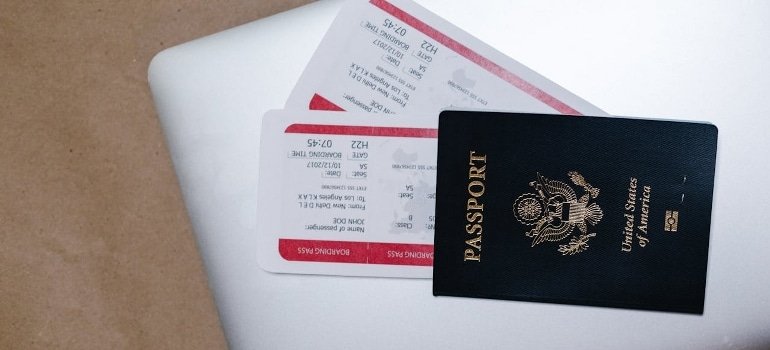How to Budget for an International Move: Smart Financial Planning Tips

Get a Free Moving Quote Now!
Start Your International Moving Journey





Moving to a new country will be a major turning point in many people’s lives. Even the thought of moving to a new culture, taking up a new job opportunity, and making lifelong friends will seem exciting to you. However, budgeting for an international move is essential – you need to be practical and create a financial plan for relocating to a new country, which won’t be an easy thing to do.
Planning for an international move can be a stressful and confusing process. Before you create a financial plan for your relocation, consider the following essential elements:
1. Research the Cost of Living in the New Country
The Internet will be the easiest way to research the cost of living for most countries. You will come across multiple travel bloggers who write about how much they spend on moving to different countries.

Furthermore, you can check grocery stores and restaurant menus online before moving to a new country. You can comprehensively research the real estate portals and get access to every type of place to live in the new country.
The budget for moving abroad should be based on your destination country. There will be many places with modest living expenses and outstanding culture, for example, Thailand, Mexico, and Hungary. On the other hand, iconic cities such as New York, Paris, Tokyo, and Copenhagen are among the most costly in the world.
2. Passport and Visa Expenses
If you are moving abroad, there are essential documents like a passport and visa (for both of which include fees). The new passport fee, for example, is about $140 in the United States, and visa fees depend on your destination and purpose of relocation.
Certain countries even demand evidence of income or funds for visa applications. For example, Canada requires proof of funds for every member of a family, Hungary requires about $2,200 per month, and Iceland requires around $7,500. Make sure to research all these requirements thoroughly and plan for them in your international moving budget.

3. Shipping Expenses
When moving overseas, you have to think about how you are going to ship your possessions across the ocean. If you are carrying everything with you in-flight, it is both checked and carry-on baggage. But when transporting your household items long-term, you have the shipping methods of air freight and ocean freight—air freight is faster but pricier, while sea freight is cheaper but slower.
4. Housing Costs and Accommodation
Housing costs are one of the most important factors in calculating the budget, regardless of the move type. Here’s what you may need to consider:
- Consider the hotel accommodation cost if you think your new house won’t be ready to move in until the time you relocate to the new country. This will increase your overall budget.
- You may need to pay a security deposit if you want to secure your new house in the new country. This may include advance rent or any other fees that you may need to pay before relocating to the new house.
5. Consider the Cost of the Lifestyle You Want
Some expats will prefer to adopt a budget-friendly lifestyle while living abroad. Usually, a digital nomad or a retired person will prefer a country with low living expenses; others may want a lifestyle the same as their home or have some additional luxuries in the new country.
Here’s what you must keep in mind while determining the cost of your lifestyle:
- Don’t consider the cost of visiting home while living in another country for the long term
- If you need to visit your house two or three times a year, it’s recommended to include such expenses in your budget
- Adjust your lifestyle in the new country if you want to keep your lifestyle-related expenses under control
6. Healthcare Expenses and Insurance
You will need to choose your healthcare or insurance plan based on the destination country. If you are a digital nomad or traveling on a job visa, you will need to prove that you have health insurance.
Having health insurance will reduce your moving stress considerably. Furthermore, having access to a quality healthcare plan will keep your stay abroad safe and secure medically.
Moreover, if you have travel insurance, you will enjoy extra support against emergencies and thefts.
Tip: Find a trustworthy insurance service provider, as they will help you with a coverage plan that is suitable for your budget.

7. Prepare for the Emergency Fund
By preparing an emergency fund, you will keep yourself covered for an unfortunate event.
- You need to question yourself: what kind of an emergency may arise while you relocate to a new country?
- If you opt for a high-deductible insurance plan, some of your medical care expenses and losses due to theft would be covered
- If family is your priority, keep funds for a flight ticket, which you may need any time to go home in case of an emergency
Overall, creating a budget for moving overseas will help you draw a picture of your life in the country. You will come to know about many new things, which you might have never expected in your life.
By getting to know things you can enjoy in your new life in the new country, you will be inspired to save the money you will need for the same.
FAQs
How much should I have saved before moving abroad?
Most experts recommend saving anywhere between three and six months’ worth of living expenses, plus money for flights, deposits, and emergencies.
How can I budget for an international move?
Start by making a list of all the potential costs—visas, housing, travel, shipping, medical. Then calculate your cost of living per month with services like Numbeo or Expatistan and add a 10–15% buffer for unforeseen costs.
What are hidden costs when you move abroad that people usually overlook?
Commonly overlooked costs include shipping fees, losses incurred in changing currency, visa renewals, inoculations, and transporting the family pet. Don’t forget to budget for these little extras.
What are the ways to minimize the costs of an international move?
Get a few moving quotes, ship less stuff, book flights early, and think about sea freight instead of air. He added that you should also establish rental terms and inquire about local SIM or insurance deals once you arrive.
Should I create a separate bank account for my overseas moving costs?
Yes. You can also pinpoint where that money is going and ensure you don’t exceed your budget for the move when you dedicate a special fund to it instead of allowing those funds to get lost in another savings account.
How does budgeting for a temporary assignment vary from planning for a permanent move?
Housing and travel are often your biggest costs when moving temporarily. However, if you are moving permanently, you will have to budget for a greater number of expenditures, such as residency permits, local healthcare, school fees (if required), and daily living costs.
What do I need to know about exchange rates and my international move budget?
Fluctuations in currency can quickly add to your costs. If you can, fix your exchange rate up front (there are international transfer services that can do this) or build in an additional 5–10% to ensure a buffer against changes in rates.
